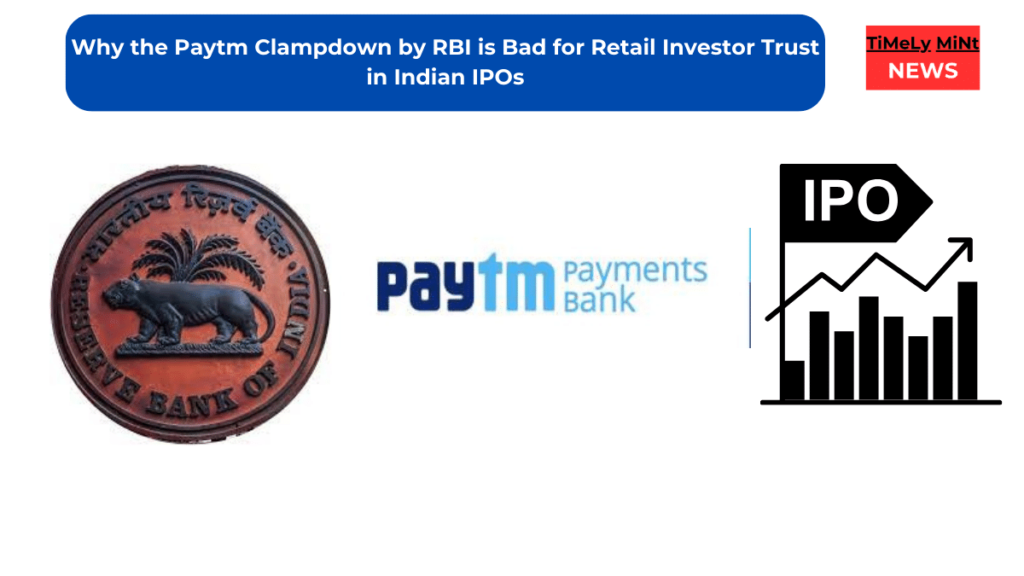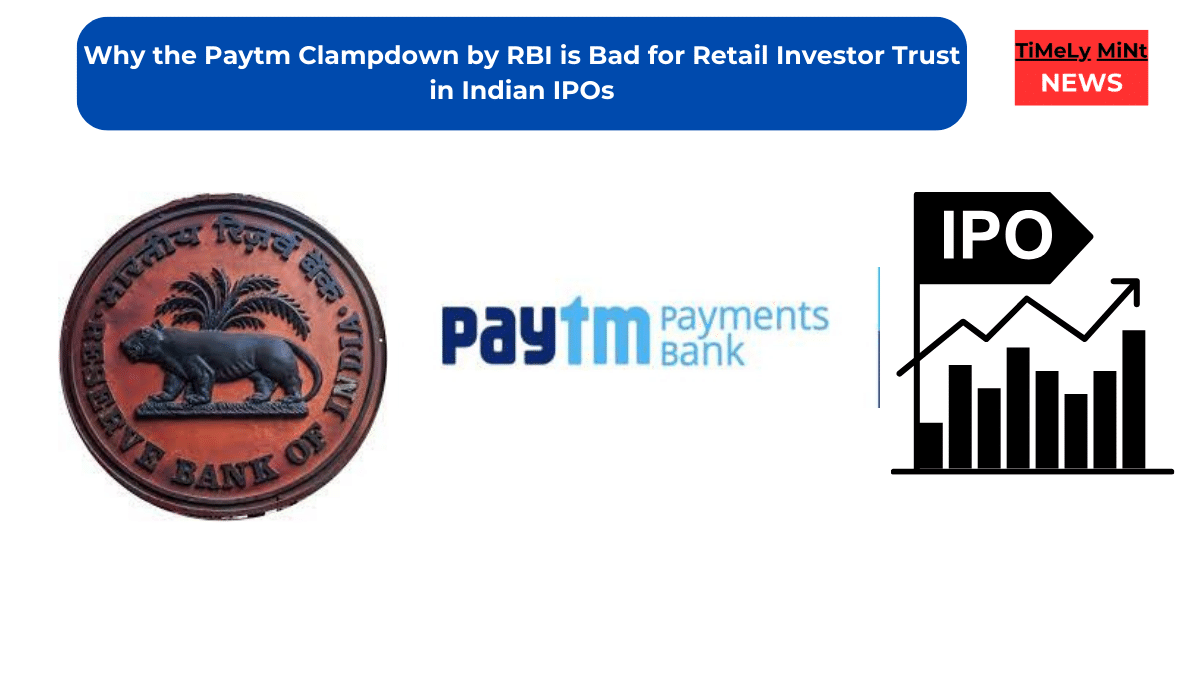The recent regulatory crackdown on Paytm by the Reserve Bank of India (RBI) has sent shockwaves through India’s startup and investor community. Paytm, one of the poster children of India’s booming startup ecosystem, has seen its valuation tumble by over 60% since its high-profile IPO in late 2021. This dramatic fall from grace has wider implications for retail investor trust in Indian IPOs going forward.

A Promising Beginning Turns Sour
Paytm made history when it went public in November 2021 in India’s largest ever IPO at the time, raising over $2.5 billion at a $20 billion valuation. Paytm was touted as a homegrown fintech success story, having pioneered digital payments in India with its e-wallet service. The company had over 330 million registered users and seemed poised for strong growth.
The IPO saw strong interest from institutional investors but muted retail investor interest. Nevertheless, the stock popped over 40% in its debut trading session in a show of exuberance. However, the exuberance soon turned into despair as the stock began to nosedive. It has plunged over 75% from its IPO price till date.
Regulatory Crackdown Sends Valuation Tumbling
The biggest blow came in January 2024 when the RBI directed Paytm Payments Bank, the company’s banking arm, to stop onboarding new customers due to “material supervisory concerns.” This led to fears that Paytm’s license could get cancelled. The news sent Paytm’s stock price crashing, wiping out over $6 billion in market capitalization in just a few trading sessions.
The RBI found several violations of Know Your Customer (KYC) norms and money laundering regulations in Paytm Payment Bank’s customer accounts. This raised alarms since a cancellation of its license could cripple Paytm’s operations and business model. Investor fears set in about the viability of Paytm’s operations going forward.
Why the Crackdown is Bad for Investor Trust in IPOs
The dramatic downfall of a recent IPO darling like Paytm is likely to erode retail investor trust in future IPOs of loss-making startups. Here’s why:
- Regulatory risks underestimated: The Paytm case shows that regulatory risks were severely underestimated during its IPO pricing. Investors are likely to be more wary of taking on such risks associated with startup IPOs lacking a long compliance track record.
- Business model uncertainties: Profitability has remained elusive for Paytm despite rapid growth. The regulatory crackdown has accentuated uncertainties about whether its business model is fundamentally sound. This may make retail investors warier of money-losing startup IPOs.
- Growth assumptions questioned: Paytm’s growth trajectory has sharply reversed after showing initial promise. This may lead investors to question ambitious growth assumptions that startups make during IPO roadshows.
- Governance risks highlighted: The fact that Paytm had widespread KYC and money laundering violations despite being a regulated entity raises red flags over its governance standards. This may dent investor confidence in startup management teams.
In essence, retail investors in India have been left with a bitter aftertaste from the Paytm IPO pop and subsequent flop. After initial IPO exuberance, the risks have clearly outweighed the rewards. Restoring investor trust after such debacles tends to be an uphill climb. And markets have long memories when it comes to losses.
Paytm still retains immense brand equity and a leadership position in India’s digital payments market. However, execution missteps have led to eroded goodwill with stakeholders ranging from customers to investors and regulators. The company faces an uncertain future unless it can radically transform its business model and governance practices.
The wider Indian startup ecosystem also faces collateral damage from high-profile failures like Paytm’s post IPO performance. India has seen a startup boom in recent years, with abundant capital and a growing list of unicorns. However, the Paytm case may give retail investors a reason to push back on sky-high startup valuations unless business fundamentals and compliance track records inspire confidence.
Regulators such as SEBI and the RBI also need to take this as a cue to tighten IPO screening norms for loss-making startups. Robust governance standards and adequate regulatory compliance need to be ensured before allowing startups to access public capital through IPOs. Else retail investor trust which has been gradually improving in Indian capital markets may see a reversal.
Paytm’s fate remains uncertain given the regulatory overhang. But its fall from grace offers important lessons for retail investors, startups, regulators and other stakeholders to make Indian capital markets less prone to such boom and bust cycles. Paytm’s clampdown by RBI has clearly dented retail investor trust in IPOs. Rebuilding this trust will require collective action by various ecosystem stakeholders.
Frequently Asked Questions
Why is Paytm banned by RBI?
The RBI banned Paytm Payments Bank from onboarding new customers due to several violations related to Know Your Customer (KYC) norms and money laundering regulations. It found hundreds of thousands of accounts that could potentially be involved in money laundering.
Is Paytm money banned?
No, Paytm e-wallet and UPI payment instruments have not been banned. Only Paytm Payments Bank has been barred from onboarding new customers. Paytm’s payment instruments remain fully operational.
Is Paytm app approved by RBI?
Yes, the Paytm app and platform are approved by the RBI. Paytm Payments Bank is the entity that has been barred temporarily from onboarding new customers due to compliance violations found in some accounts.
Is Paytm closing down in India?
As of now, there is no information on Paytm shutting down operations in India. However, if Paytm Payments Bank’s license gets cancelled due to regulatory non-compliance, it can have significant repercussions on Paytm’s operations and business model.
Is Paytm app closing?
No, the Paytm app and platform remain fully functional. There are no plans announced to discontinue the Paytm app. Only new customer onboarding has been halted for Paytm Payments Bank by the banking regulator RBI.
Is Paytm bank shutting down?
Paytm Payments Bank has been barred from onboarding new customers and carrying out several banking activities from February 29, 2024. However, there is no confirmation if it is completely shutting down. There are speculations over its license getting scrapped.
Is Paytm bank risky?
Yes, regulatory uncertainties pose significant risks for Paytm Payments Bank. Account closures, scrapping of its license and wider business model implications for Paytm cannot be ruled out given the serious nature of compliance violations highlighted by the RBI.
Which bank owns Paytm?
Paytm founder Vijay Shekhar Sharma and One97 Communications own 51% stake in Paytm Payments Bank. The remaining 49% stake is owned by private sector lender One97 Communications which is the listed entity operating the Paytm brand.
Why is Paytm blocked?
The RBI has barred Paytm Payments Bank from onboarding new customers and carrying out several banking transactions from February 29, 2024 due to violations of KYC and money laundering regulations found in hundreds of thousands of accounts.
Why did Paytm fail in India?
Paytm had initially succeeded in India by pioneering digital payments via its popular e-wallet service. However, new competitors, regulatory troubles plaguing its banking arm, persistent losses and post-IPO stock declines have led many to question if Paytm’s business model is fundamentally unviable.
Is it safe to use Paytm?
Yes, Paytm’s e-wallet, UPI and payment instruments remain safe to use as per regulators. Paytm also claims to have strong security measures to prevent frauds. Only its banking arm has faced regulatory action over compliance violations in certain accounts.
What exactly happened with Paytm?
Paytm Payments Bank was barred by the RBI from onboarding new customers due to violations of KYC and money laundering regulations found in hundreds of thousands of accounts. This led to over 60% crash in Paytm’s stock price as investors panicked.
Is Paytm a success or failure?
The jury is still out over whether Paytm will eventually emerge as a success story or not. While it has achieved tremendous scale, the regulatory troubles plaguing its banking arm have raised existential questions. Its post-IPO performance has certainly been a failure thus far.
Disclaimer:
All news, articles, commentary, opinions, reports, analysis, images, videos, data, and other information published on this site are based solely on publicly available information gathered in good faith. We strive for accuracy and transparency by citing multiple credible sources, fact-checking information, and clearly distinguishing between news reporting, commentary, and opinion pieces. However, we cannot independently verify or guarantee the accuracy of aggregated news content. No fictional or fabricated news content is knowingly created or published on this site. By accessing this site, you acknowledge that our content relies on available public discourse rather than private sources or invention.













